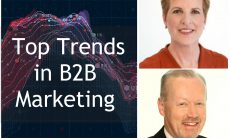Welcome to the second installment of our new series on marketing technology. We’re taking a deep dive into this industry because as marketers, our technology infrastructure supports everything we do. Martech impacts not only our daily tasks but our broad strategy work. To gain perspective on the evolving industry, I’ve created a series where you’ll hear from the people behind the top marketing technology products out there. Our first interview was with Chris Jacob, Director of Product Marketing for Salesforce Marketing Cloud. In this interview, Jeffrey Vocell shares his work as Principle Product Manager for the HubSpot Growth Platform. This marketing technology stack is a full suite of software for marketing, sales, and customer service with a free CRM at its core.
How did you get interested in this work?
I’ve always been interested in the intersection of consumer psychology and marketing. I’ve been a part of a number of marketing technology startups, like analytics for small business marketers, and A/B testing for large enterprises. That taught me a lot about this intersection and ultimately brought me into product marketing. I joined HubSpot because the company was founded on the principle of creating a helpful and human customer experience. And that mission really resonated with my interest and passion.
How about some history. When it first came on the market, what made Hubspot stand out? Why was this technology built?
HubSpot was the first all-in-one suite of tools covering everything a marketer needed to run their website, generate and convert leads, and analyze performance. Since the initial release in 2006, we’ve innovated and grown the Marketing Hub. It includes full website creation and hosting, marketing automation, email marketing, live chat, social media marketing, SEO, advertising automation, and more.
Marketers have always been responsible for creating a great experience that is human and helpful by attracting, engaging, and delighting customers. Today it’s more important than ever in a world of endless notifications, attention-stealing pop-ups, and time spent across a multitude of devices that we create marketing people will love. Which is exactly why we built the Marketing Hub.
At its core is our free CRM. This connects all of your critical customer data directly to every interaction and experience you create in marketing. Because all the marketing tools you need are directly in HubSpot, you can holistically measure success and true ROI from the first action to becoming a customer.
Holistic conversion tracking is one promise of a marketing stack. What else do you see as the unique value of a stack versus point solutions?
Customer expectations and the demand for convenience are more important than ever. A recent HubSpot survey found customers look to communicate with brands across 13 different channels, and expect a response in 10-minutes. It’s clear from this data that buyers want frictionless and near-immediate ways of communicating with brands that are relevant to them.
HubSpot’s Marketing software is an all-in-one solution designed to help you create great experiences through every aspect of your marketing with data about your customers. With deep intelligence about your prospects, and customers, you can easily create personalized and relevant experiences.
Marketers are ultimately responsible for growth, so with an all-in-one solution you can spend less time on integration and management, and more time creating content, campaigns, and generating results.
What marketers need most: trust
So much to manage! What do you think marketers need most urgently now? How can Hubspot support these needs?
Because our roles have expanded, there are a number of urgent needs for marketers today. Among the most important are trust, and a frictionless experience. In our survey on acquisition costs we found trust is at an all-time low for marketers. We found that 81% of people trust advice from friends and family over businesses. To establish trust we need to create relevant and helpful marketing. We need content that surfaces in the right channel at the right time, but we also need to create experiences that are empathetic. Data is our currency in marketing and we need to consider how we’re creating holistic experiences in an empathetic way.
The second initiative is creating a frictionless experience. Why do you think Netflix succeeded over Blockbuster? It’s largely because consumers didn’t need to leave their house and drive to the movie store just to watch a new movie. Netflix fundamentally changed expectations, and as marketers we need to consider the expectations we — and our competitors — are creating and remove as much of the hassle as possible. This may mean placing live chat on specific pages, or creating a response time SLA for customer emails. Reducing this friction will ultimately help your business delight more customers and win more deals.
So how do we execute upon these goals? What is your organization doing to help marketers learn best practices?
We believe the next-generation of marketers needs to be customer-centric, and focused on growing with customers rather than at the expense of them. That’s why we built HubSpot Academy which offers dozens of free courses and certifications for the marketers just getting started and for professional marketers. From social media strategy, to SEO, and the importance of storytelling it’s all available in HubSpot Academy.
HubSpot Academy content is taught in thousands of classrooms, and recognized by employers across the world.
Thanks so much for being with us, Jeffrey! And thank you, readers. Comments? Questions? Please chime in below and we’ll respond as best as we can.





